IHE Healthy Ageing Challenge Award: the Dragons Den event
7 July 2023
On Tuesday 27 June we held the Healthy Ageing Challenge Award Dragons Den event. Here's the four projects and a summary of their pitches.
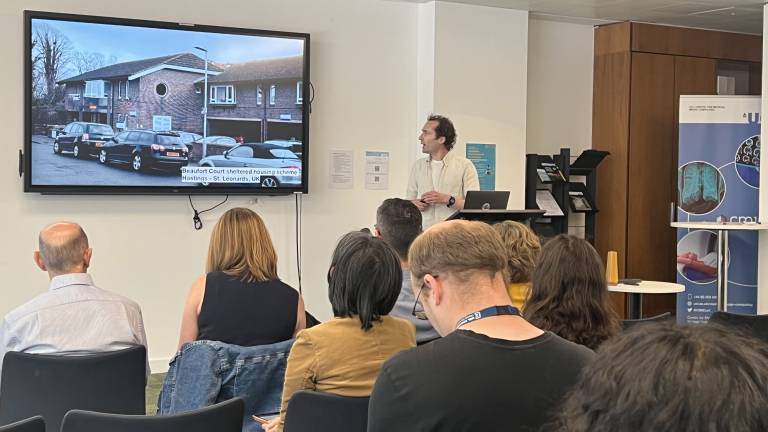
In 2022 we launched the IHE’s Healthy Ageing Challenge Award where we gave four projects £10,000 each to develop a technology solution to the issue of ageing well.
At the end of the award period, all four projects were entered into a Dragon’s Den competition, with one successful project going on to win a further £50,000 funding from the Rosetrees Trust.
On Tuesday 27 June, we all went to 90 High Holborn to see all four project leads demonstrate their proof of concepts and pitch for the extra £50,000.
Here’s what they spoke about:
MadhanKumar Vasudevan
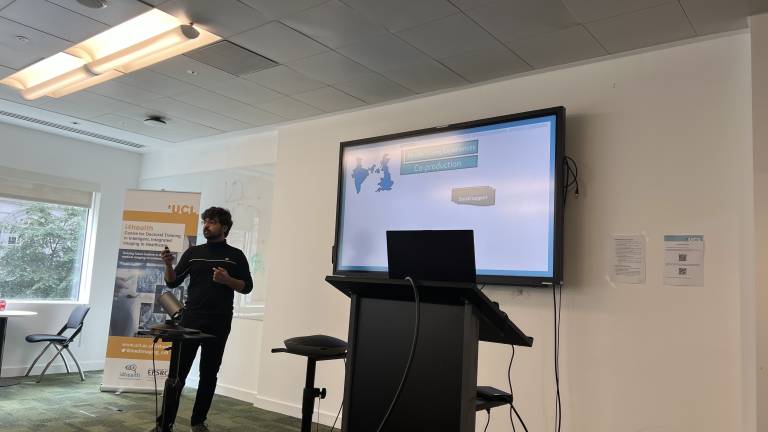
Are we using technology to its fullest extent? Madhan is working on how doing mindful exercises before sensory stimuli can elevate that stimulus. His study looked at whether mindfulness before using haptics tech, or tech that stimulates the sense of touch or motion, can improve system performance of the haptic device thus showing how mindfulness can heighten your other experiences.
The extra £50,000 will help further the project by focusing on wellbeing and fill in the gaps in the research already carried out. He hopes his haptic device, a device that uses air and pressure to draw on your hand/body, will serve as a device for emotional and social wellbeing and help heighten our sensory experiences.
Cian O’Donovan
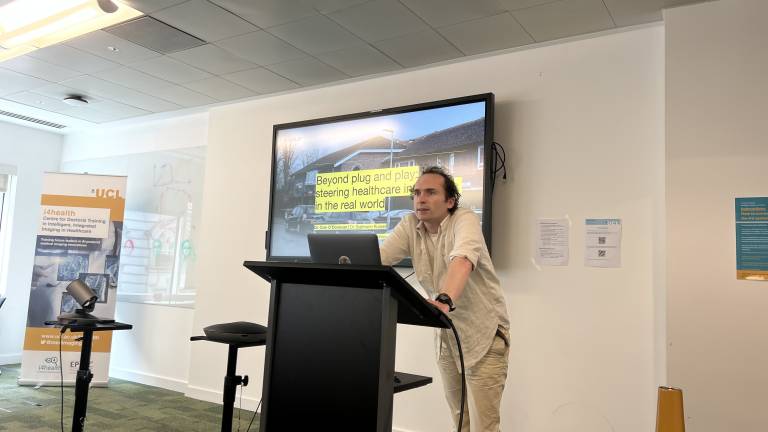
is looking at what we’re creating devices for. Are they going to be useful and improve people’s lives? Do we think about whether the technology is actually accessible? Does the user have internet?
Cian is looking at “steering” the direction of research and changing research culture. He wants to make sure that the people who will use the tech have a hand at steering the wheel and directing research to what is important for them.
Cian wants to create a platform for collectively steering research projects and strengthen research clusters by evaluating them systematically. For example, we’ve got a lot of healthy ageing projects but they’re all scattered and don’t speak to each other – how do we do that? He also wants to provide recourses to mitigate the barriers researchers face and cultivate research that steers innovation in the direction we need rather than what we think the community needs.
The £10,000 already given was used to fund research infrastructure. The £50,000 would be used to support other projects in conducting meaningful research with members of the public.
Moe Elbadawi
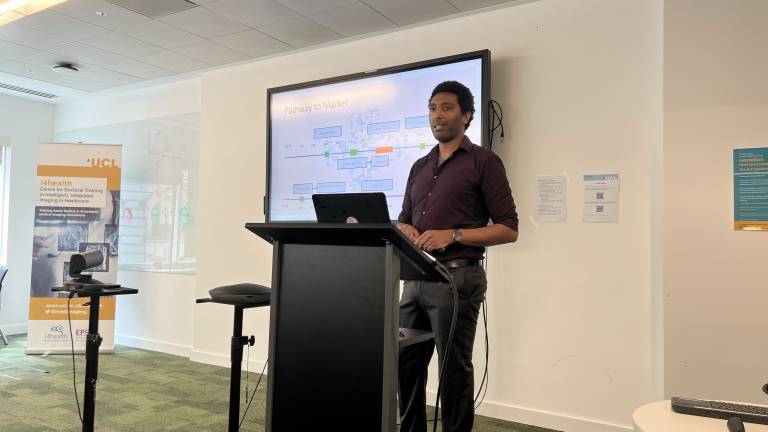
Moe’s working on a pharmaceutical tool that provides on demand medical. The app monitors and reminds patients when to take their medication, and how much of it to take. The patient takes a picture of the pharmaceutical box, and all the information is there! The app also has voice recognition so you can also speak to it, thus making it more accessible.
You might be asking why he’s developing such an app – well it’s because 40 – 60% of medicine fails, mainly due to patient error, which in turn costs £1.5 billion in medical costs. But it’s not just patients, there are also medical errors and the app can help mitigate that, especially when it comes to drugs that sound very similar to each other.
How is this app better than the competition though? A lot of other apps require you to input the information in yourself but here you can use speech or text for the app to pull in the required information. The app also leverages magnetic molecular knowledge so it can tell you if one drug will negatively affect another drug. Moe has also been working with those that speak English as a second language to make sure they can access it too.
The £50,000 will be used to fund a pilot study, improve the user interface, and will finally be deployed in the NHS and care homes. The money will also help fund a continuous feed of co-production, or of feedback from the community that will be using it. Currently it’s being used as a wellness app, but Moe’s idea is to turn it into a medical device – and for those of us familiar with this process, it’s not easy, and it can take a long time but the funding will help make that process a reality.
Yu Wu
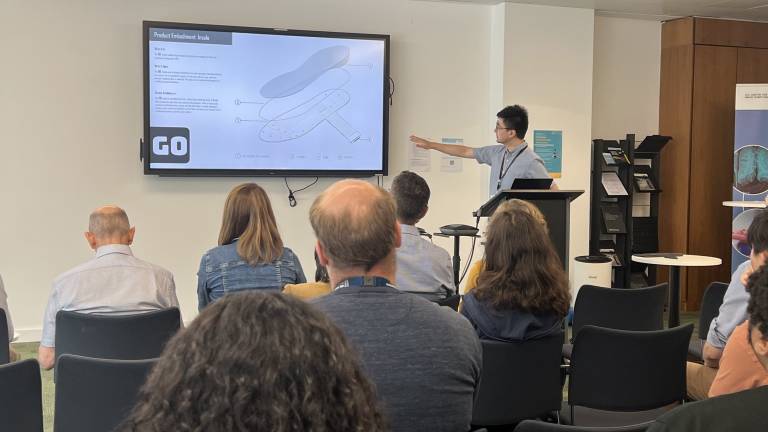
Yu is looking at frailty, and the associated risk of falling, hospitalisation and even mortality. Frailty itself is costing the NHS £5.8 Billion each year so it’s a big problem. But healthy ageing can reduce the risk of frailty through exercise but there are some barriers to this, and this is what Yu is focusing on, especially post rehabilitation monitoring as well as injury avoidance exercises.
Current exercise technologies tell you how much you’ve done something but not how well you’ve done it – for that you’ll have to access specialist equipment or a sports coach, and that isn’t feasible for a lot of people. Yu and his team are working on a specialist wearable motion system that analyses gait. It’ll be like a wristwatch that fits around your waist and your ankles, depending on what you want to measure.
Using discrete sensors in hydrogel fluid, the device detects pressure. When you take a step, the step deforms the hydrogel, and the sensors pick this up. And hydrogel is what makes this product competitively viable as it’s a cheaper material and so will provide low cost manufacturing costs.
Within the first year, Yu and his team have achieved a lot with their £10,000. With the extra £50,000 they will be running clinical trials, pay people’s salaries, buying items and software updates.
All four project leaders did an amazing job in showcasing their work within a strict ten-minute timeframe. After some deliberation from our judges, Moe and Yu are now in the final. Richard Ross, Chairman of Rosetrees Trust, will now take the two finalists' pitches to his team of researchers to pick the winner.
Dr Eric de Silva, Research and Development Manager at the Institute of Healthcare Engineering, ran the Dragon’s Den event and has been supporting all four candidates with their projects. This is what he had to say about the event:
“It was so impressive to see how far the four IHE pump-primed projects have come along in just a year, having gained invaluable insight by embracing the co-production initiatives that were baked into the programme from the get-go. It is no easy task to compress so much work and vision into a ten-minute pitch in front of judges and audience, followed by quick-fire questions.Our Project Leads performed admirably, with charisma and professionalism. They are truly an outstanding group of young scientists and the IHE looks forward to supporting them in the next stage of their translational journey.
 Close
Close

